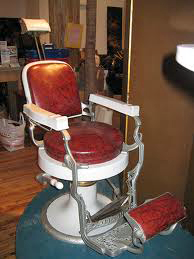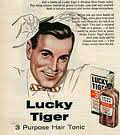Walk westerly a hundred steps or so from Winklers’ Drug Store in Caney Kansas around 1945 and you’d find yourself in front of one of the most consistently busy “stores” in town: Floyd Swayne’s Barber Shop. This was a male kingdom. If testosterone had color you could have seen it oozing out from under the front door and seeping onto the sidewalk. The occasional woman who intruded was either the kind who would brazenly walk into an 1870’s Dodge City Saloon or al Mom whose husband wasn’t around to bring their boy-child in for a haircut.
Inside, Floyd had three barber chairs lined up in a row. They were the now-old-fashioned kind that the barber, by operating a lever alongside the chair, could elevate to bring heads up to a comfortable working height for the barber. The chairs had comfortably thick padding for backs and butts and a footstool, padded on one side, that any guy over 10 years old could rest his feet on.

These chairs could be easily turned around to face the big mirror that covered the entire wall behind them. When the barber thought he was finished he would spin the chair around so that we could see for ourselves. He would hold a hand mirror behind our heads so we could see it we were satisfied back there.
When we were satisfied with our hair we were treated royally for a few moments. Unless we told him not to the barber would take a large bottle of “Lucky Tiger,” a strong smelling kind of hair oil, from the counter beneath the mirror, put a goodly amount in his palm, rub it vigorously onto our hair and scalp and then comb our hair whatever way we wore it. The “Lucky Tiger” held it in place quite a while.

He had a large, soft-bristled brush that seemed to be filled with some kind of nice-smelling powder. He used it to sooth the back of our neck - in the process brushing away stray hair cuttings and raising a nice cloud of powder behind our head. At last he would whip the huge piece of cloth that covered us from neck to knee off of us, give it a good shake, spilling hair onto the floor and say “Next,” as we climbed down from the chair. We left feeling good about ourselves and feeling we’d been pampered a little. It was always easy to know when a guy had recently had a haircut. You could smell him several feet away, but it caused us no embarrassment.
On Saturdays all three of the barber chairs would be occupied pretty much non-stop all day long. On the back wall a theater type chair was mounted firmly on a “shelf” high enough so that a guy should sit in that chair and put his feet on a pedestal and have a young boy shine his shoes. Provided a young boy could be found who didn’t mind sitting idle a long time. There weren’t many takers for shoeshines.
There were almost non-stop conversations between the barbers and the customers they were working on and those who were waiting in chairs along the wall across from the barber chairs. Most of the time the talk was about some athletic team, or high school, college or professional. In 1955 the “Philadelphia Athletics” became the “Kansas City Athletics.” That was a big subject of conversation in the barbershop but that interest didn’t translate to ticket sales. After 13 lackluster seasons, when at times the number of people in the dugouts and on the field was almost equal to the number of spectators, they moved to Oakland. However there was always Caney High Schools’ teams and athletes and its opponents to talk about And K.U. (University of Kansas) Once in a while someone would tell a mildly off-color joke. Not really X-rated but one we wouldn’t tell our Mother.
If they didn’t care to talk the waiting customers could read one of the many magazines lying about. Those were magazines about hunting and fishing or catered to men. No “smut” was allowed. The raciest ones to be found were “True, The Man's Magazine “Esquire,” and “True Detective” magazines.
Floyd didn’t have the only barbershop in town. There was another a block west, owned by Hank Surret. But Hank’s shop didn’t have as large or loyal a following. He wasn’t as gifted a conversationalist as Floyd Swayne and his shop just didn’t have the pizzazz, or as we now say “ambiance.” It was just a place to get a haircut.
As barbershops gave way to “Hair Salons” and are frequented by both men and women. those who wield the clippers became “Stylists” and the testosterone, Man's Kingdoms disappeared. And with them, a piece of Americana was lost.